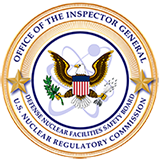Independent Evaluation of the DNFSB’s Implementation of the Federal Information Security Modernization Act (FISMA) of 2014 for Fiscal Year 2020
Report Information
Recommendations
Implement procedures and define roles for reviewing configuration change activities to the DNFSB’s information system production environment by those with privileged access to verify the activity was approved by the system CCB and executed appropriately.
Implement a technical capability to restrict new employees and contractors from being granted access to the DNFSB’s systems and information until a non-disclosure agreement is signed and uploaded to a centralized tracking system.
DNFSB resources. DNFSB relies on documented procedures to ensure that users are not granted access to DNFSB information systems prior to completion of required training & signing of the IT User Agreement/Rules of Behavior form. DNFSB has created a new System Authorization Access Request (SAAR) process and automated workflow in SharePoint to streamline the new account creation process and is also in the process of acquiring an agency-wide automated ticketing solution, which will be used to more fully automate standard processes such as account provisioning/de-provisioning. When this new system is implemented, DNFSB will be able to close this Recommendation. DNFSB plans to acquire this new ticketing system in Q4 2023 and put it into production by Q2 2024.<br />
Implement the technical capability to require PIV or Identification and Authentication Level of Assurance (IAL) 3 to all DNFSB privileged accounts.
Implement automated mechanisms (e.g. machine-based, or user-based enforcement) to support the management of privileged accounts, including for the automatic removal/disabling of temporary, emergency, and inactive accounts, as appropriate.
<br />
Status: Open: Resolved. DNFSB has determined that automated management of privileged accounts presents a higher risk than the current manual process of account review. DNFSB has implemented a manual review of account activity based on automated reports sent from the Varonis tool weekly. Administrators review this data and act in accordance with DNFSB policies and procedures.<br />
DNFSB will request a risk acceptance for this recommendation by Q4 FY23.<br />
Continue efforts to develop and implement role-based privacy training.
any additional privacy training will need to be coordinated with the Senior Agency Official for Privacy (SAOP).<br />

